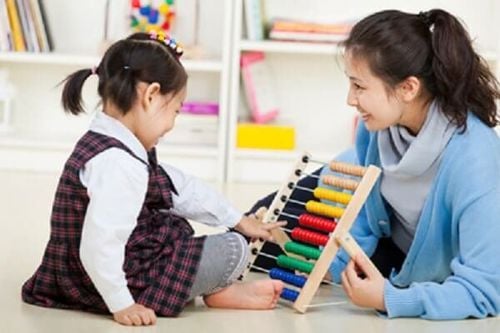This is an automatically translated article.
Parents play a big role in helping children develop language skills and literacy skills. Research shows that talking, reading and rhyming to children is a very effective way for children to develop these important skills.
1. Distance from
You may have heard of the "word gap" study where, by the age of 3, there is a 30 million word gap between children from the poorest families and children from the richest families. Recently, this study has attracted some backlash; Some said its sample size was too small (42 families) and that the study results focused too much on families and schooling was not enough.
That said, regardless of a family's income, parents also play a big role in helping children develop language skills. Building reading and writing skills will help children succeed in reading. But what can you do for your little one? Start with 3 simple suggestions backed by research: Talk a lot, read a lot, and rhyme a lot.

Cha mẹ đóng vai trò chính trong việc giúp trẻ phát triển khả năng ngôn ngữ
2. Three ways to help young children build language and literacy skills
Talk a lot The best way to increase your child's vocabulary is to talk to them. No need to use simple words or slur or distort sounds... In fact, teaching children to communicate through talking to them as you would an adult is a great way to encourage development. language development from birth. For children who are already talking, narrate what you are doing when you interact with them (Example: We're going to buckle up in the car seat now). As children begin to develop language skills, hold "conversations" with them, giving them time to babble and then respond in complete sentences.
Read a lot No matter what age your child is, reading a lot is an important and enjoyable habit. Research shows that when you read to young children daily, they add 1 million words by the time they start kindergarten. As your child gets older, start talking about what you've read. Ask your child to predict what might happen next, share favorite parts of the story, and make connections between the stories in the book and your own life.
Rhymes Rhymes are a childhood tradition and for a reason, too. Rhyming can be a bit silly and fun, but it's also a great way to help children adjust to the sound of words. While you may not be teaching your child the different sounds directly, playing with rhymes will help them begin to compare and contrast words and sounds. Try reading rhyming poems, singing rhyming songs, or simply listing rhyming words (older kids will love this too).

Gieo vần giúp trẻ điều chỉnh âm thanh của từ tốt hơn
Children need to provide enough elemental zinc/day for them to eat well, reach the correct height and weight and exceed the standard. Zinc plays a role in affecting most biological processes taking place in the body, especially the breakdown of nucleic acids, proteins... Organs in the body when zinc deficiency can lead to a There are a number of diseases such as neurological disorders, irritability, etc. Therefore, parents need to learn about the role of zinc and guide them to appropriate zinc supplements for their children.
In addition to zinc, parents also need to supplement their children with other important vitamins and minerals such as lysine, chromium, B vitamins,... errands.
Please regularly visit Vinmec.com website and update useful information to take care of your baby and family.
Reference source: babycenter.com













